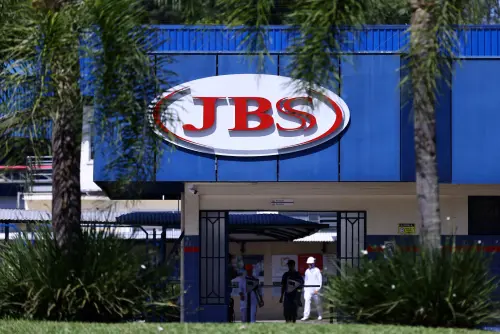Brazilian meat processor JBS' decision to pursue a U.S. listing has brought attention to its second-largest shareholder, the National Development Bank's (BNDES) investment arm, and whether this move aligns with the bank's mission of promoting Brazilian corporate development.
As the world's largest meatpacker, JBS has taken significant steps toward a dual listing, which has been in discussion for years, leading to an 18% increase in its shares on Tuesday. The dual listing aims to attract more investors and potentially raise JBS' valuation to align more closely with its peers.
Shares saw a modest increase on Wednesday.
The development bank's investment arm, BNDESPar, announced its decision to abstain from voting at an upcoming shareholders meeting regarding the proposal to list JBS shares on the New York Stock Exchange through a Dutch subsidiary.
Before this announcement, market speculation focused on whether BNDESPar would support JBS' global listing strategy, given the bank's mandate to prioritize Brazilian economic interests.
BNDESPar has been a significant stakeholder in JBS since 2007, when it helped finance acquisitions of U.S. brands like Swift and Pilgrim's Pride in a strategy aimed at fostering "national champions."
While one analyst suggested that BNDESPar's abstention indicated opposition to the listing, a source familiar with the negotiations revealed that the bank's lawyers were working on an agreement with controlling shareholder J&F Investimentos to allow BNDESPar to maintain a substantial ownership stake.
This transaction was designed to prevent BNDESPar from needing to sell its shares immediately on the market. The bank will evaluate opportunities to either sell or acquire more JBS shares in the future.
BNDESPar, which holds 20.8% of JBS shares, effectively shifted the decision on the dual listing approval to minority investors. J&F, controlled by JBS' founding Batista family and owning 48.3% of the shares, has made a similar commitment.
Analyst Igor Guedes at Genial Investimentos remarked that the official JBS statement implied BNDES' opposition to the dual listing, as the agreement was structured to prevent an opposing vote that would likely have been cast at the shareholders meeting.
Both JBS and BNDESPar declined to comment.
JBS' proposal for a U.S. listing is contingent upon approval from the Securities and Exchange Commission (SEC), with no specific timeline established for regulatory clearance.
While the SEC has not publicly commented, a source knowledgeable about the commission's internal discussions suggested that regulators find JBS' proposed dual listing structure viable.
Guedes noted that SEC concerns regarding ownership concentration might also have influenced the agreement between J&F and BNDESPar. This arrangement could indicate the bank's willingness to reduce its stake if necessary for the listing's approval.
Leonardo Alencar, an analyst with XP Investimentos, challenged the notion that a potential sale of a BNDESPar stake could facilitate SEC approval of the dual listing. He also pointed out that the agreement between the two largest shareholders could lead other minority shareholders to seek similar protections to those secured by BNDESPar, which has guaranteed compensation of up to 500 million reais ($88.14 million) if JBS shares fail to meet a specified threshold following the planned listing. The exact threshold has not been disclosed.
The company's plans have drawn criticism from groups in the U.S. and the UK, which have sent letters to the SEC expressing concerns regarding JBS' environmental impact and allegations of corruption involving members of the founding family.
